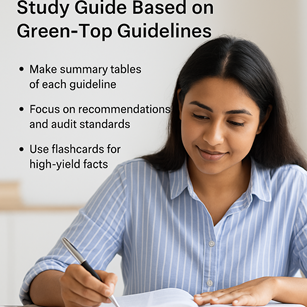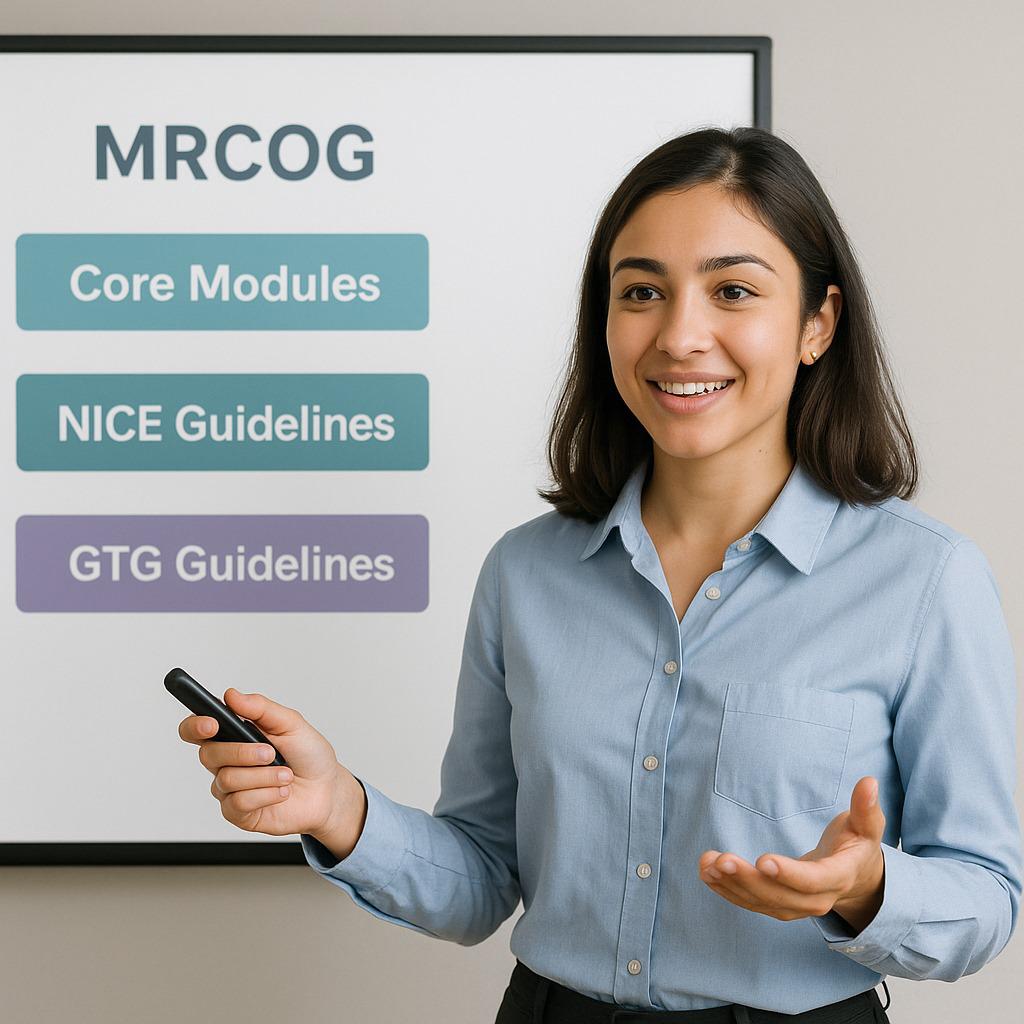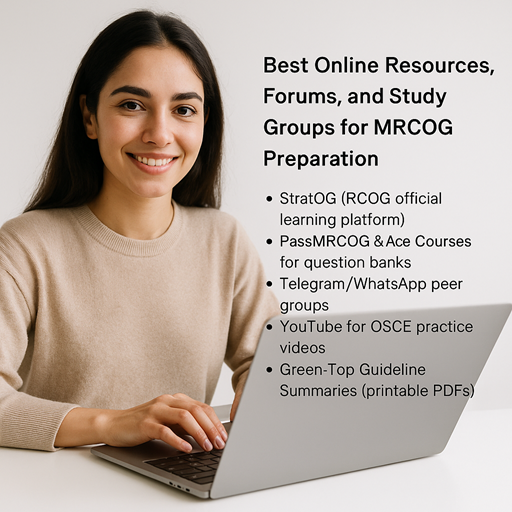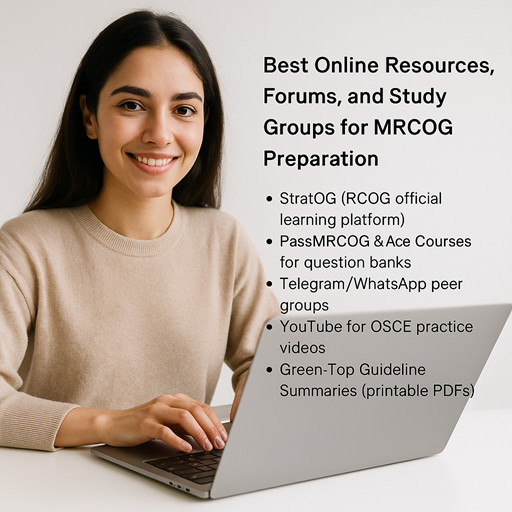2025-04-23 | Category: Mrcog 2

📘 Mastering MRCOG Part 2:
Study Guide Based on Green-Top Guidelines
The MRCOG Part 2 examination is a high-stakes
assessment that tests more than just knowledge—it evaluates your ability to
apply evidence-based medicine in real-world clinical scenarios. At the
heart of this lies the Green-Top Guidelines (GTGs) issued by the Royal
College of Obstetricians and Gynaecologists (RCOG).
To succeed, candidates must blend clinical reasoning,
risk management, patient-centered care, and up-to-date guidance from GTGs,
TOG articles, and NICE recommendations.
In this guide, we’ll explore a strategic roadmap to
preparing for MRCOG Part 2 using the Green-Top Guidelines, question banks, and
practice techniques that mirror the exam format.
🧠 Why Green-Top
Guidelines (GTGs) Are Essential
The GTGs are evidence-based clinical practice guidelines
developed by RCOG to support decision-making in UK obstetric and gynaecological
practice. In the Part 2 exam:
- 📝
Most SBAs and EMQs are directly based on GTG content
- 🔬
Questions test not just “what is the answer?” but “why?”, according
to current guidance
- ✅
The GTGs reflect clinical governance, audit standards, and patient
safety—key themes in the MRCOG blueprint
🎯 High-Yield GTGs to
Prioritize
While all GTGs are valuable, some are more frequently
tested due to their clinical importance:
|
GTG Number |
Topic |
Why It's High-Yield |
|
GTG 37a |
Venous Thromboembolism (VTE) |
Risk scoring, thromboprophylaxis, maternal safety |
|
GTG 52 |
Postpartum Haemorrhage (PPH) |
Emergency response, escalation, blood products |
|
GTG 56 |
Maternal Collapse |
Rare but critical; ABCDE approach, differential diagnosis |
|
GTG 36 |
Group B Streptococcus (GBS) |
Prevention of early neonatal infection |
|
GTG 63 |
Antepartum Haemorrhage (APH) |
Placenta praevia, abruption, emergency care |
|
GTG 42 |
Induction of Labour |
Timing, methods, indications, risk discussion |
🔗 View the complete
GTG list here: RCOG
Green-Top Guidelines
📚 Key Strategies for
MRCOG Part 2 Preparation
✅ 1. Summarize Each GTG into
Structured Notes
Create high-yield revision documents per guideline:
- Background
& epidemiology
- Investigations
- Management:
conservative, medical, surgical
- Audit
standards
- Strength
of recommendations (A, B, C, ✓)
🖇️ Use tables,
flowcharts, and mnemonics to condense information.
✅ 2. Align with Core MRCOG Themes
While revising GTGs, pay special attention to the following:
- 🛑
Patient Safety – e.g., preventing maternal death, escalation of
care
- 📊
Audit & Governance – understanding audit criteria in each GTG
- 📜
Consent & Ethics – ability to counsel and involve women in
decisions
- ❤️
Maternal Medicine – co-morbidities like cardiac disease, diabetes,
epilepsy
✅ 3. Incorporate Clinical
Vignettes
Real success lies in application, not memorization.
Create clinical scenarios from GTGs:
"A 32-year-old woman presents at 34 weeks with
shortness of breath and unilateral leg swelling… What’s the VTE risk score?
Should you anticoagulate?"
This helps prepare for:
- SBA
logic-based questions
- Risk
scoring tools (e.g., VTE, hypertension, sepsis)
- Guideline-based
clinical reasoning
✅ 4. Practice SBAs and EMQs Daily
Daily question practice is non-negotiable for MRCOG
Part 2.
📌 Focus on:
- Timed
sets of 20–30 questions
- Reviewing
explanations thoroughly
- Creating
a “mistake log” for weak topics
✅ 5. Attend Revision Webinars and
GTG Review Classes
Live and recorded webinars help clarify difficult topics and
provide:
- Real-time
interaction
- Summarized
GTG reviews
- Hot
topics identified by tutors (e.g., GTG 1 for cervical cerclage, GTG 10 for
epilepsy)
MRCOG PASS EXAMINATIONS offers weekly GTG spotlight
sessions and monthly SBA mock reviews.
✅ 6. Use Cross-Referencing with
NICE Guidelines
NICE guidelines often complement GTGs in exam questions
(e.g., NG25: Preterm Labour, NG121: Intrapartum Care). Use both
when revising overlapping areas.
🔗 Key link: NICE
Guidelines Library
✅ 7. Develop a Weekly Study Plan
|
Day |
Activity |
|
Monday |
GTG review (e.g., GTG 37a) |
|
Tuesday |
SBA/EMQ timed test (20 questions) |
|
Wednesday |
TOG article + GTG audit standards |
|
Thursday |
Clinical vignette mapping |
|
Friday |
Past paper or mock test |
|
Saturday |
Live revision webinar |
|
Sunday |
Reflective summary & flashcard creation |
❌ Common Pitfalls to Avoid
- 🔁
Relying solely on books instead of current GTGs and TOG articles
- 📘
Memorising facts without understanding clinical application
- ⏱️
Not practicing questions under timed conditions
- ❎
Ignoring examiners’ feedback and reports
- 📉
Skipping mock exam performance reviews
💬 Real Candidate Tip:
“I focused on one GTG per day and practiced 20 SBAs after
reading it. Within a month, I covered all core guidelines and could apply them
instinctively during mocks.”
— Dr. Shalini R., MRCOG Part 2 Passer, March 2024
🧰 Resources to Support
Your Journey
🔹 GTG Summary Templates
(PDFs)
🔹
Clinical Scenario Builder Tool
🔹
Weekly SBA Quizzes
🔹
Peer Telegram Groups for Case Discussion
🔹
Feedback-based Mock Analysis Tracker
👉 Explore all these on MRCOG PASS EXAMINATIONS
🚀 Final Words
Success in MRCOG Part 2 lies in understanding guidelines,
applying clinical reasoning, and practicing consistently. The Green-Top
Guidelines are not just exam content—they’re what you’ll use every day as a
clinician. Study them deeply, practice them repeatedly, and apply them
confidently.



